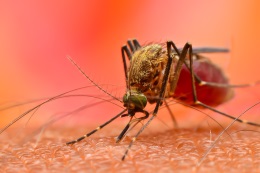19 August 2019
 While there’s a lot of talk that global warming will increase the prevalence of diseases like Dengue Fever and Malaria in parts of Australia, a UniSA expert says it is the weather impacts of climate change on infrastructure that are more likely to have an effect of the spread of mosquito-borne diseases.
While there’s a lot of talk that global warming will increase the prevalence of diseases like Dengue Fever and Malaria in parts of Australia, a UniSA expert says it is the weather impacts of climate change on infrastructure that are more likely to have an effect of the spread of mosquito-borne diseases.
Associate Professor Craig Williams believes the aftermath of floods, fires and cyclones will test the advanced health infrastructure and sanitation systems that countries like Australia have in place.
“Extreme weather events can have a huge impact on ecosystems and make some areas more hospitable for mosquitoes, but in Australia we are well protected by strong infrastructure and health systems,” Assoc Prof Williams says.
“Our neighbours, on the other hand, places such as Papua New Guinea and Indonesia where Malaria, Chikungunya and Dengue Fever are already a problem, can expect problems to intensify.
“By studying the biology of mosquitoes and understanding the conditions that enhance their activity we can help to support programs to reduce these diseases for our closest neighbour countries.
“We can expect that global warming will change landscapes, it will impact ecosystems and cause imbalances and whenever that occurs, we open the door for new diseases to spread.”
Assoc Prof Williams says the work done to understand the environment and the conditions that encourage the proliferation of mosquito-borne diseases is an important part of fighting the devastating impact of diseases such as malaria, chikungunya and zika.
And while Assoc Prof Williams is working to reduce the impact of mosquito populations and to find methods for protecting people from their bite, UniSA researchers are also working to develop some of the most advanced vaccination technologies to ensure protection against these devastating diseases is more affordable, storable and effective.
UniSA molecular and cellular immunologist, Prof John Hayball says partnered research with colleagues QIMR Berghofer Research Institute and biotech company, Sementis Limited, is bringing forth advanced immunisation technology that will be more affordable for developing countries.
“A new altered vaccine, named the Sementis Copenhagen Vector (SCV), has been shown to provide protection against Chikungunya infection and its virus-induced complications and Zika virus.
“The first human immunogenicity trial of the combined Chikungunya/Zika vaccine will commence through Australia’s most experienced clinical trial centre, CMAX, early next year and we expect the vaccines will go into production after those trials are assessed.”
Prof Hayball says the research to support the development of a new kind of vaccine platform should lead to more innovations in vaccine delivery and provide greater accessibility for poorer nations to protect against some of the most devastating mosquito borne diseases.
Tomorrow is World Mosquito Day, observed annually on 20 August to commemorate of British doctor Sir Ronald Ross's discovery in 1897 that female mosquitoes transmit malaria between humans.
UniSA media contact:
Michèle Nardelli phone: +61 418 823 673 or +61 8 8302 0966 email: michele.nardelli@unisa.edu.au


